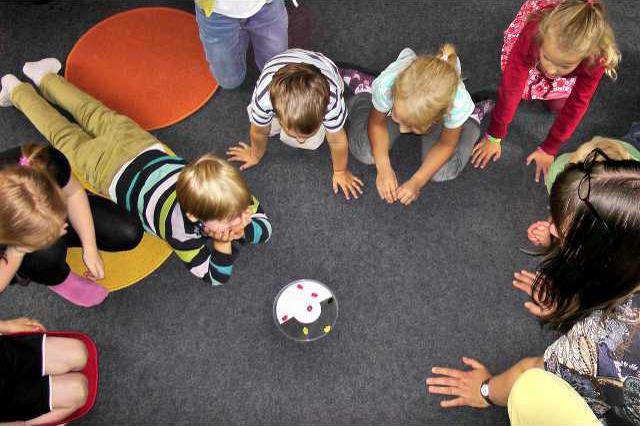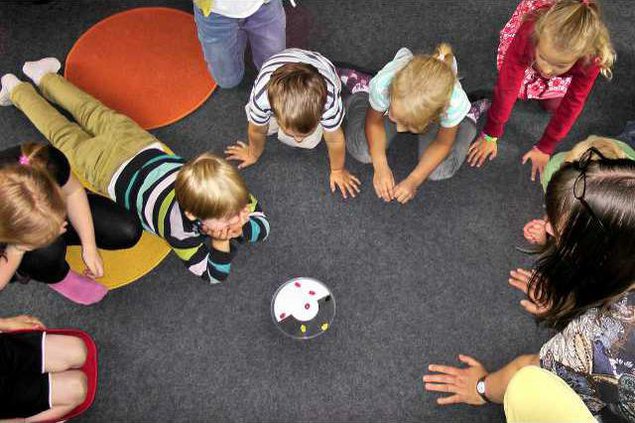Finnish kindergarten students don't even try to learn to read, noted Tim Walker, an American who lives and teaches fifth grade in Finland, in The Atlantic. Kindergarten in Walker's adopted country is largely devoted to play, discovery and socialization.
"Just before lunch, a kindergarten teacher took out a basket brimming with childrens books," Walker wrote. "But for these 5- and 6-year-olds, 'reading' looked just like how my two toddlers approach their books: The kindergartners, sitting in different corners of the room, flipped through pages, savoring the pictures but, for the most part, not actually deciphering the words.
Anni-Kaisa Osei Ntiamoah, one of the teachers, told Walker only 1 in 15 of her students could read. "We dont push them but they learn just because they are ready for it. If the child is willing and interested, we will help the child, she told him.
The notion that Finnish schools might understand something about childhood that we have lost is not new. Deseret News National noted last year how seriously Finnish educators take recess time, reinforcing Walker's experience.
"Finnish school days are short and there is plenty of free time for deep play in after-school programs," the Deseret News reported. "The fifth-graders Walker teaches endure just five hours of school, including breaks, and they are not given homework. A normal day for a first-grader in Finland is like a half day for American kids just three hours long."
The frequent breaks keep kids fresh, and the shorter school days give kids lots of opportunity for deep play, Walker said.
Walker's take on Finland reflects a growing challenge to academic pressure at younger grades that has evolved in the U.S. over the past decade.
A 2009 report by the Alliance for Childhood, called Crisis in the Kindergarten, warned of growing academic pressure squeezing out developmentally appropriate learning practices of play and socialization, calling for a reversal of the pushing down of the curriculum that has transformed kindergarten into de facto first grade.
And in a new working paper, three researchers at the University of Virginia have collected hard data on these changes over time, finding that in recent years academic pressure has grown considerably.
"Kindergarten teachers in the later (recent) period held far higher academic expectations for children both prior to kindergarten entry and during the kindergarten year," the report concluded. "They devote more time to advanced literacy and math content, teacher-directed instruction and assessment, and substantially less time to art, music, science and child-selected activities. Changes were most pronounced for schools serving high proportions of low-income and non-white children."
"Just before lunch, a kindergarten teacher took out a basket brimming with childrens books," Walker wrote. "But for these 5- and 6-year-olds, 'reading' looked just like how my two toddlers approach their books: The kindergartners, sitting in different corners of the room, flipped through pages, savoring the pictures but, for the most part, not actually deciphering the words.
Anni-Kaisa Osei Ntiamoah, one of the teachers, told Walker only 1 in 15 of her students could read. "We dont push them but they learn just because they are ready for it. If the child is willing and interested, we will help the child, she told him.
The notion that Finnish schools might understand something about childhood that we have lost is not new. Deseret News National noted last year how seriously Finnish educators take recess time, reinforcing Walker's experience.
"Finnish school days are short and there is plenty of free time for deep play in after-school programs," the Deseret News reported. "The fifth-graders Walker teaches endure just five hours of school, including breaks, and they are not given homework. A normal day for a first-grader in Finland is like a half day for American kids just three hours long."
The frequent breaks keep kids fresh, and the shorter school days give kids lots of opportunity for deep play, Walker said.
Walker's take on Finland reflects a growing challenge to academic pressure at younger grades that has evolved in the U.S. over the past decade.
A 2009 report by the Alliance for Childhood, called Crisis in the Kindergarten, warned of growing academic pressure squeezing out developmentally appropriate learning practices of play and socialization, calling for a reversal of the pushing down of the curriculum that has transformed kindergarten into de facto first grade.
And in a new working paper, three researchers at the University of Virginia have collected hard data on these changes over time, finding that in recent years academic pressure has grown considerably.
"Kindergarten teachers in the later (recent) period held far higher academic expectations for children both prior to kindergarten entry and during the kindergarten year," the report concluded. "They devote more time to advanced literacy and math content, teacher-directed instruction and assessment, and substantially less time to art, music, science and child-selected activities. Changes were most pronounced for schools serving high proportions of low-income and non-white children."

